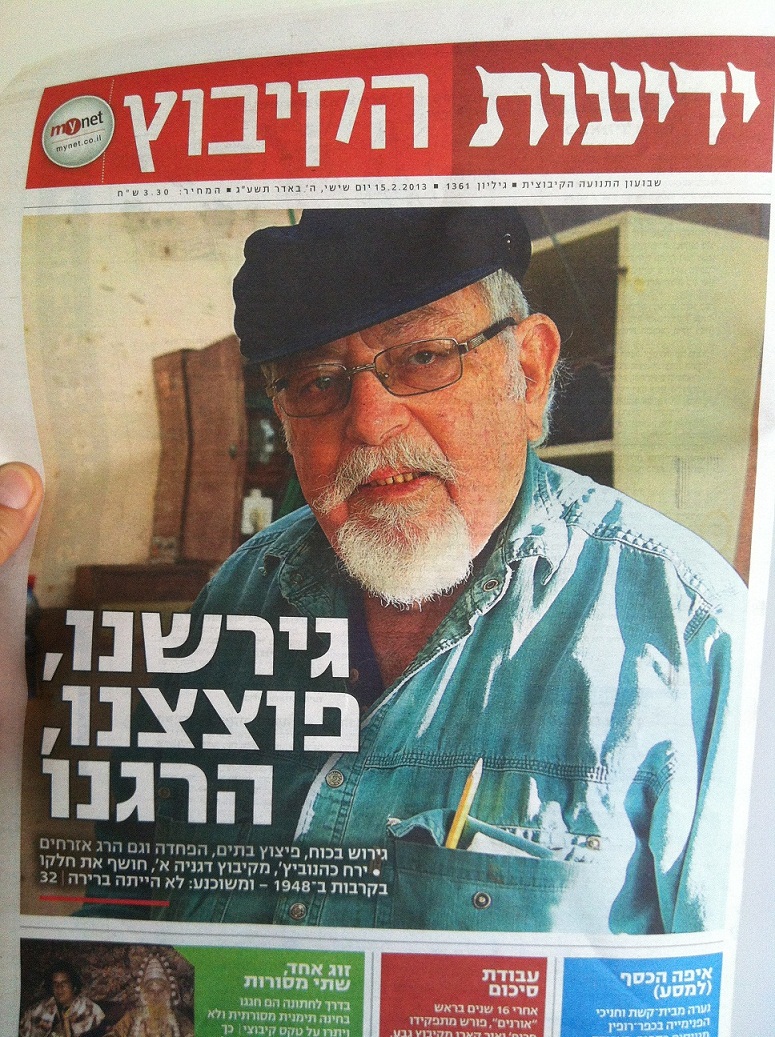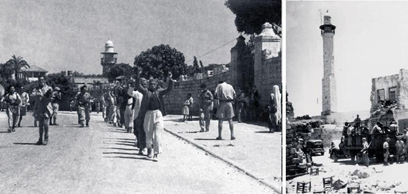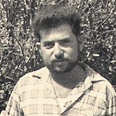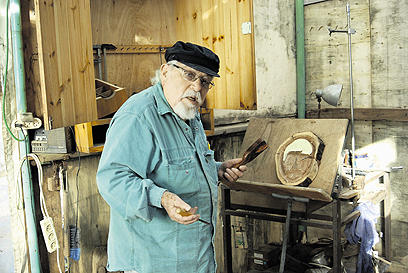
In his appearance, clothing, beard and mustache, 83 year-old Yerachmiel (Yerach) Kahanovich from Kibbutz Degania Aleph looks a bit like an aging Greek sailor (albeit without the requisite forearm tattoo). Indeed, the sea – both the Mediterranean and the Sea of Galilee – is his great love, and like any veteran sailor, he would happily share tales of the happy days when would venture forth in boats and ships, as well as of not-so-happy days when circumstances forced him to expel and kill Arabs. He recently found out that a conversation held with him about those latter days is included among testimonies presented in an exhibition by Zochrot.
Before the Independence War started, during his Palmach training at Ein Harod, which combined military drills and farm work – he excelled in the explosives course. "One day, Yitzhak Sadeh came over, gathered us round and told us that we need artillery, but since we have none, he said, I will be the gunner and you will be the shells. In other words, he will aim, and wherever he aims, that's where we will plant the explosives".
"We had no choice"
We are seated together in the courtyard, only a few dozen yards from the Sea of Galilee filled up by the recent rains, the winter sun tanning his shorts-clad legs – and then the explosives come in. Partly because his memory is not what it used to be, and partly because some things "are better left unsaid", not to mention names, our conversation is not fluent but rather fragmented, and often broken off. Time and again it requires encouragement, clarifications, subterfuges, which are countered by dodges and obfuscations.
"I had all sorts of special jobs", Yerach immediately starts. "For example, as the bodyguard of our father, Yigal Allon. Usually a truck would arrive, and we would get on it and go where it would drive us".
What was your first battle?
Yerach: I believe it was with the folks from the Ramat Yochanan training group. Near Haifa, or maybe in Al-Malkiyya. I was the sharpshooter. I still carry the scar. It was a tough battle.
Did you blow up houses?
We blew up houses everywhere. It was no big deal.
Did you let the inhabitants get away?
At first, yes. The idea was to expel them – these were the orders given by our bosses, Yigal Allon and Yitzhak Sadeh. Sometimes we had to shoot one or two, and then the others got the message and took off on their own. You have to realize, if you did not demolish the Arab's house, he would always want to go back. When there's no house, no village, he has nowhere to go back to. It's that simple.
Do you remember the battle in Lod and Ramla?
I don't like remembering this… We fired shells into a mosque where plenty of people were hiding. We had no choice.
We fired?
I did. With the PIAT [anti-tank gun]. It has an enormous blast.
And what was the outcome?
Not pretty. They were all smeared on the walls.
How many, roundabout?
I don't know. Plenty. I didn't count. I opened the door, saw what I saw, and closed it behind me.
What did you feel?
What do you feel after such a thing? But if we didn't do it, perhaps we would have had to fight to this day. Later, I stood with my Browning above the riverbed through which the remaining townspeople fled. Whoever strayed off the path got shot.
Also by you?
Also by me. I felt very bad, but I was a good shot, and at times the asked me to shoot only a single bullet. In a village near Ramla, two were enough. After 45 minutes the village was empty. They took the hint.
Do you remember any other battles?
The battle for Jerusalem. In the Latrun Monastery, if you look at the top third of the roof, to the left, you will see even today a piece of concrete instead of the tile that used to be there. A sharpshooter fired at us from there, and he does no more. Even here, northwest of the Sea of Galilee, there were battles. We moved from one village to the other, kicking the villagers out. Some fled on boats to the other side, and when they gave the order, I would shoot the boat and make a hole in it".
People drowned?
I have no idea. I didn't check.
"It feels bad"
After doing such things, did you feel guilt? Unease?
I resented myself for being so talented and required to do those things. When a child beats a child, and breaks his leg, let's say, perhaps he didn't mean to, but he did it anyway, and it feels bad. This is war. They started this war, we didn't start it. They kept killing Jews the whole time. At first, at least, it was always a reaction on our part.
And later it was our initiatives?
I think that it was we who initiated the capture of Eilat, but I wasn't there. I was in Company 1 at the Palmach's First Battalion. Our commander [Dan Laner] had been trained with Tito in Yugoslavia, he was his deputy. These were professional warriors, and they could live with the war. I was mentally unprepared. That's why I left the military as soon as I could. I could go on serving as a career officer, but I chose not to.
Did your conscience bother you?
I'm asking you: If you caught a Jewish spy working for the enemy, and carried out the sentence, will it leave a scar in your heart?
Have you ever carried out such a sentence?
Among other things… it felt like murder. It had nothing to do with the war, and he was a Jew. Such things can never be forgotten.
Did you act out of hatred for the Arabs?
No. Even today I don't hate Arabs. I have Arab friends. When I worked in the Galilee, and we dug the Jordan Canal, the foreman from one of the Arab villages, and he was a good friend of mine, almost like a brother. The way I see it, the Arabs had faith in their leaders and followed them, and I had faith in my leaders and followed them. Maybe that's why I managed to fight – not out of hatred, but level-headedly, knowing it was necessary.
Were you mad at them?
We were mad at them because of the invasion. What were they thinking? We had told them, I mean our leaders had told them that they'd better not. So if they insisted on invading and starting the war, we were just as insistent. I am mad at them for making me do things that are out of my character.
Do you remember any Israeli fighters who refused to follow certain orders?
There were some fighters who said they would not kill a Jew caught spying, or were known for this, so they let others do it. War is not dignified. It is dignified to stay alive, to raise a family.
Did you hear about Dir Yassin?
Heard about it. Wasn't there.
What do you think about it?
You tell me. Why did they pick on them ? You figure it out. |
Do you think it was an act of vengeance?
The Arabs stated clearly that they wanted to kill us, because this land was theirs. We said, no, it's ours, and if you want to kill us, than we also know how to kill. From time to time they have leaders who whip them up into frenzy, so we fight – not in order to kill them, but so that we may live, at the price they had set.
He concludes the interview with a story heard from the late Eliyahu Nawi: A man deep in debt was forced to sell his house. But he did it on one small condition: the nail stuck in the wall, a reminder of his father, would remain his, and he would come to visit it from time to time. They buyer agreed to this condition. After a year, the man came to the house, went up to the nail, polished it, stayed there for a while, and then took off. After several months he visited again. Then he would come every month, and later every day, until the new owner had enough and said to him: Take the house and go to hell. Did you get it? We Jews came to polish the nail.
But they haven't given up the house yet.
Not yet.
Palmachnik Testimonies
Perhaps it was Yerach's willingness to tell tales of yesteryear that made him "bite the hook ", as he puts it, and open up – he can no longer remember exactly when it was – to an interviewer, whose name or affiliation he can no longer recall, but it is clear, so he says, that had he known that the his words as recorded by that Jon Doe would be used by Zochrot and presented in its exhibition in Tel Aviv he would have kept his mouth shut.
The man who interviewed and filmed Yerach, the man whose name he cannot recall, is documentary filmmaker Eyal Sivan. Yerach was interviewed as part of a series of personal 60-to-90 minute interviews with more than a score of Palmachniks, about half of them kibbutzniks. In their abridged 10-to-20 minute versions, these were presented for three months in an exhibition curated by Sivan, called Common Archive – Testimonies by Zionist Fighters in 1948.
The exhibition included direct testimonies by people who took part in expelling, looting and killing Palestinians, as well as first-hand hearsay testimony about such acts. Zochrot spokesperson Eitan Bronstein: "Time and time again, the interviewees testify to the camera how easy and systematic the expulsion from villages and towns actually was: 'We simply opened fire, and they took off'. Importantly, most acts of expulsion took place not in the course of the fighting and as part of it, but beside it".
Bronstein attaches special importance to Yerach's testimony, which is the longest. "The story about the Lydd massacre, in which an estimated 200 civilians lost their lives, is not new. However, this is the first indication of the identity of the man who actually shot the deadly shell, and of his own mouth. It is regrettable that Kahanovich regrets having given this testimony. His reaction is characteristic of the difficulty of many Israelis to take responsibility for atrocities such as he has admitted to have committed in 1948".

לוד בנכבה / Lyyda at the Nakba

ירחמיאל כהנוביץ' בצעירותו / Young Yerakhmiel Kahanovitz

ירחמיאל כהנוביץ' בביתו בדגניה א' / At Home, Yerakhmiel Kahanovitz

